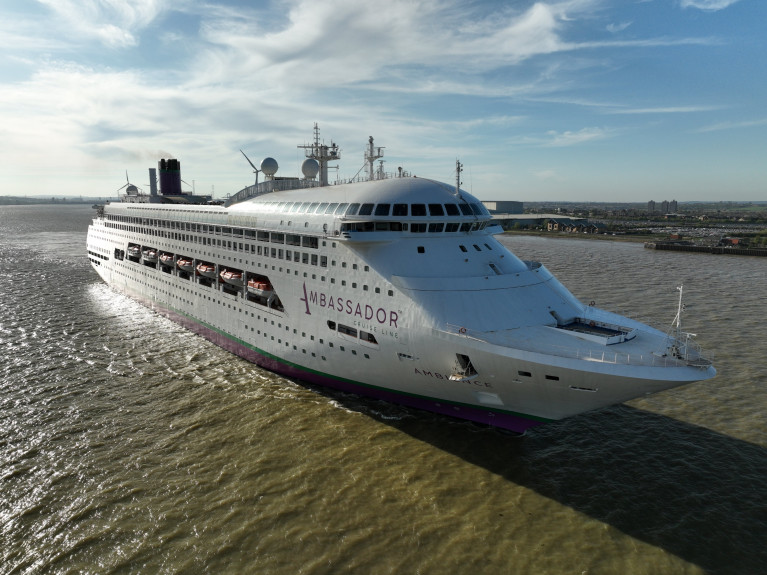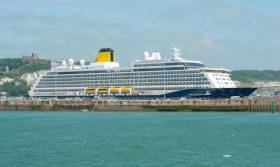Displaying items by tag: Maiden Cruise
New UK Cruise Operator Completes Maiden Voyage to Germany With Debut Call to Ireland in May
Ambassador Cruise Line, the UK's newest cruise operator whose Ambience has completed a 4-day round trip maiden voyage from its London homeport of Tilbury to Hamburg, Germany, writes Jehan Ashmore.
In advance of Ambience's inaugural cruise that departed the London International Cruise Terminal, Tilbury on Tuesday, the ship’s Godmother, Sally Gunnell, the former British athlete and Olympian named the operator's first cruiseship.
The maiden cruise of the 70,285 tonnes cruiseship however was delayed by a fortnight as the ship when in a Croatian drydock yard for engineering works had delays in the supply of marine gas. The rescheduled London-Hamburg minicruise led to two Norwegian Fjords cruises having to be cancelled.
The 1,400 guest capacity cruiseship built in 1991 had served Princess Cruises as their first Regal Princess and also as the renamed Pacific Dawn.
Ambassador Cruise Line is the first new UK based operator in more than a decade since the formation of Cruise & Maritime Voyages. As Afloat reported in 2020, CMV however went into administration due to the severe impact on the industry caused by the pandemic.
CMV were frequent callers to Belfast, Dublin and Cork with the latter two ports as homeport to Magellen offering direct cruises for Irish cruise-goers.
The former CMV Chief Executive Officer, Christian Verhounig, Afloat has identified continue in the same role for Ambassodor Cruise Line and where he heads the management team based in Purfleet, Essex.
Another former member of the CMV team, Simon Weeks who was their Chief Administrative Officer has taken up a position with Ambassador Cruise Line albeit in the role of Chief Technology Officer.
Likewise of CMV, Purfleet located on the north bank of the Thames estuary is where Ambassador Cruise Line's head office is based. The company is aimed at the UK market offering non-fly cruises and is predominately for the 50-plus traveller.
All cruises will be based out of Tilbury with a curated no-fly programme of 29 inaugural year sailings.
Featured destinations will include the British Isles (and Ireland), the Norwegian Fjords, Greenland, the Arctic and Iceland in additon several short break cruises.
Afloat has examined the cruise schedule, where a 'British Isles Discovery' involves Ambience to make an inaugural call to Belfest Harbour on 7th May and the next day an Irish debut call to Cobh, Cork Harbour.
As for the winter months, there will be a range of exploration style voyages sailing to the Canaries, Cuba, the Caribbean, Cape Verde and Scandinavia.
Ambassador is also to add a second cruise ship, the 48,123 tonnes Ambition in 2023 and sail out of ports such as Belfast, Bristol, Dundee, Liverpool, Newcastle and Falmouth.
The 1,200 guest ship dates to 1999 and in recent years had served as AidaMira for German brand Aida Cruises.
Afloat will have more to report from the German cruise market as another operator from that nation is due to make a call to London this evening and is soon to visit Ireland.
UK Operator's First Custom Built Newbuild Departs Dover On Maiden Cruise Including Dublin
Saga Cruises first ever cruiseship built for the UK operator made a maiden port of call to Dublin Port this morning as part of an inaugural round Britain and Ireland cruise, writes Jehan Ashmore.
Spirit of Discovery departed Dover last week on 10 July having made history as the first ship to use the ferryport's newly refurbished £250m cruise terminal. As part of the investment is a new number 4 berth where the new ship flagged under the Red Ensign berthed in the port's western docks.
This morning's arrival of Spirit of Discovery to Dublin Port first involved having to take a pilot on board from cutter Camac off Howth Peninsula having sailed overnight from Liverpool Cruise Terminal. The day before, the newcomer made a first call to Belfast Harbour docking at berth D1 located close to Harland & Wolff.
The 58,250 gross tonnage leadship was built by Meyer Werft at their shipyard located at the inland city of Papenburg in Germany. The newcomer with a capacity for 999 guests is built for the British market, had berthed in Dublin at Ocean Pier and will remain in port until this evening. The next cruise leg is scheduled with a passage to Cobh, Cork Harbour, thus completing in visiting the main cities on the island of Ireland.
Prior to entering service, the delivery voyage from the German shipyard required a passage upriver of the Ems River to reach the North Sea. The ship which is also to cruise in polar regions has environmental design features. Among them is a first for the shipyard with the equipment of an eSiPod propulsion system delivered by well known German firm, Siemens.
The new 236m long luxury Spirit of Discovery features the design cues of cuisine and levels of service you expect in the world’s finest boutique hotels with a private balcony for every guest. The £346m newbuild was named by the Duchess of Cornwall in a christening ceremony held in the UK on 5 July at the Port of Dover.
Two days previously the keel of a fleetmate, Spirit of Adventure was laid down at the same shipyard and is due for completion next year. With the entry then of a pair of newbuilds, Saga Cruises plan to operate a World Cruise in 2022.
The return to this ship name recalls a predecessor, the much smaller Spirit of Adventure, when operating albeit for a subsidiary brand of Saga. The small ship with just 412 passengers and at just shy of 10,000 gross tonnage had called to Irish ports.
Current operator of the ship, FTI Cruises GmbH, continues to call to Ireland but under the name Berlin which was originally given to when the cruiseship was launched in 1980. Likewise of the new 'Spirit' the older cruiseship was also built in Germany but at a different shipyard.






























































